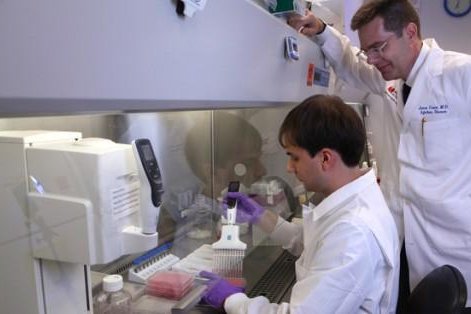Dr. James Crowe, director of the Vanderbilt Vaccine Center, watches graduate student Andrew Flyak “plate” antibody-producing B cells from people in Africa who have survived infection by the Ebola virus. Photo by Anne Rayner/Vanderbilt University
NASHVILLE, Jan. 22 (UPI) -- Scientists identified antibodies from Ebola survivors they report can kill multiple forms of the deadly virus, according to a new study.
The development changes concerns that separate vaccines or treatments would be necessary for each species of Ebola, with scientists at Vanderbilt University and the University of Texas suggesting one drug could be used to treat or prevent all types of the virus.
The Ebola virus is spread by contact with bodily fluids from infected people, killing more than one-third of those who are infected, according to the World Health Organization.
Monoclonal antibodies are clones of white blood cells fused to myeloma cells used to target specific cells. While antibody treatments cannot offer permanent protection like vaccines, they offer a temporary buffer from infection and can be used to treat people already infected with the virus.
While a vaccine showed 100 percent efficacy in a 2015, it has not been approved for use yet. Researchers also continue working on treatments for the virus, including monoclonal antibodies. Researchers at the Albert Einstein College of Medicine created a monoclonal antibody treatment using mice that kills two types of Ebola.
Scientists working on the study, published in the journal Cell, isolated and generated large numbers of monoclonal human antibodies from Ugandan survivors of a 2007 outbreak who were infected by the species Bundibugyo ebolavirus.
"In this study, a remarkably diverse array of virus-specific antibodies was isolated, which appeared to bind to various parts of the envelope protein of the virus," said Dr. Alexander Bukreyev, a researcher at the University of Texas Medical Branch, in a press release. "Some of the antibodies neutralized not only Ebola Bundibugyo virus, but also Ebola Sudan virus and Ebola Zaire virus, similar to that which caused the recent outbreak in West Africa."
Bukreyev said using human antibodies, rather than mouse antibodies as in previous studies, may lead to better treatments.
More important is that multiple studies have now found methods to attack multiple types of Ebola at a once, which could make it easier to deal with future outbreaks.
"This work suggests there are common elements across different groups of Ebola viruses," said Dr. James Crowe, a professor at Vanderbilt University. "Maybe we can come up with one therapeutic or one vaccine that would solve all of them."















